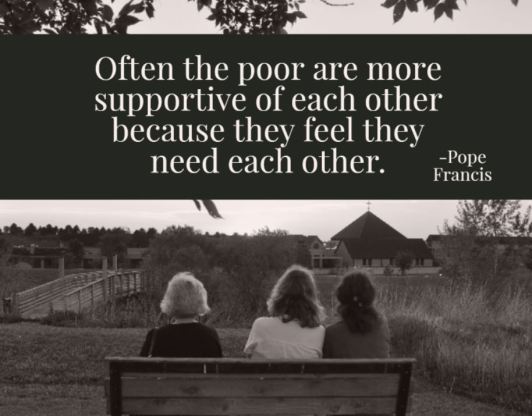
People who don’t give money to the homeless because they think it will be spent on alcohol and not food should ask themselves what guilty pleasures they are secretly spending money on, Pope Francis said. “There are many excuses” to justify why one doesn’t lend a hand when asked by a person begging on the street. (Carol Glatz, Catholic News Service, 2/28/17)
I’ve been thinking about the decision to give (or not to give) to a beggar on the street since Pope Francis suggested that giving “is always right,” whether one thinks the other is truly in need or not. A few months ago when I was leaving a movie theater, having spent an evening out with friends, I saw a homeless man with a sign asking for money. Engaged in conversation, I quickly walked passed him. I was pretty sure I didn’t have any cash on me anyway. But later, upon reflection, I realized that I did not (or could not) look the man in the eye, and I wondered why. If I had money with me, would I have given it to him? Would I have looked him in the eye then? I felt a sense of shame, partly for not giving him some money, but more so because I hadn’t looked at him directly. Looking someone in the eye honors their dignity; it acknowledges WHO THEY ARE.

I have considered more that “tossing money and not looking in (their) eyes is not a Christian” way of behaving, either. Pope Francis suggests the way one reaches out to the person asking for help is important and must be done “by looking them in the eyes and touching their hands.” It honors the dignity of the other, regardless of whether we feel the other is deserving. In this way, we face our own judgments of another, our implicit bias.
When encountering people who live on the street, the pope said he always greets them and sometimes inquires about their lives and background. He always chatted with a homeless family and couple that lived next to the archbishop’s residence in Buenos Aires, Argentina, he said, and never considered getting rid of them. When “Someone told me, ‘They’re making the chancery filthy,’ Well, the filth is within” one’s heart, he said. (Carol Glatz, Catholic News Service, 2/28/17)
Several days after walking by that beggar, my husband and I encountered the same scene, a homeless man with a sign asking for money. As we walked by, not looking at him directly, I paused. We had a quick discussion about giving some money or not, and I remembered Pope Francis’ advice: It is not my job to determine whether this man is truly in need or to be concerned about where the money shall be spent. And it’s not even about whether I can afford a dollar or two, of which I am quite able. If I can’t spare a dollar after having a lovely dinner on the way to a concert, then it says more about me than the beggar.
So I gave the man some money and I looked him in the eye. I will make this a habit. I shall give out of gratitude. I believe it will be a practice in withholding judgment and freely giving. Perhaps God is simply training me for other situations that will require a radical generosity of heart. We are all poor. Jesus said, “Blessed are you who are poor, for yours is the kingdom of God.” (Luke 6:20)
It’s important to be sincere because “people who live on the streets understand right away when the other person is really interested” in them as a person or when they just feel pity, he said. “One can look at a homeless person and see him as a person or else as if he were a dog, and they notice this different way of looking” at them, he said. When the interviewer asked why the pope thought the poor were capable of changing the world, he said that in his experience in Buenos Aires, he saw more solidarity in the slums than in less poor neighborhoods, where “I encountered more selfishness.” While there are many more problems in the shantytowns, “often the poor are more supportive of each other because they feel they need each other.” (Carol Glatz, Catholic News Service, 2/28/17)
The Gospel takes away our right forever to discriminate between deserving and the undeserving poor. ~Dorothy Day
Fr. Mauritius Wilde, Prior of Sant’Anselmo in Rome (formerly of Christ the King Priory in Schuyler, NE) looks at what being “poor in spirit” means in a recent blog post titled, “I am poor, too.” He  writes, Whenever I see a beggar, homeless or poor person in the streets, I have this moment of “Shall I or shall I not?” Pope Francis encourages Christians to give something, in any case. I know that many beggars are part of a bigger, very well organized group. What a shame that the poorest are misused in this way. So, shall I give a donation?
writes, Whenever I see a beggar, homeless or poor person in the streets, I have this moment of “Shall I or shall I not?” Pope Francis encourages Christians to give something, in any case. I know that many beggars are part of a bigger, very well organized group. What a shame that the poorest are misused in this way. So, shall I give a donation?
Recently I found myself begging for something before God. I cannot remember what I asked for. It must have been something of minor importance, but I remember the intensity of my begging – and felt ashamed. To my surprise, it seemed that God had nothing against me begging. On the contrary. “Ask and it will be given to you,” Jesus says in Matthew 7:7, describing God as a good and loving father.
“Great care and concern are to be shown in receiving poor people and pilgrims, because in them more particularly Christ is received.” (Rule of St. Benedict 53:15)
Read more at WildeMonk, Cherishing Christ Above All.


















































































































Leave a comment